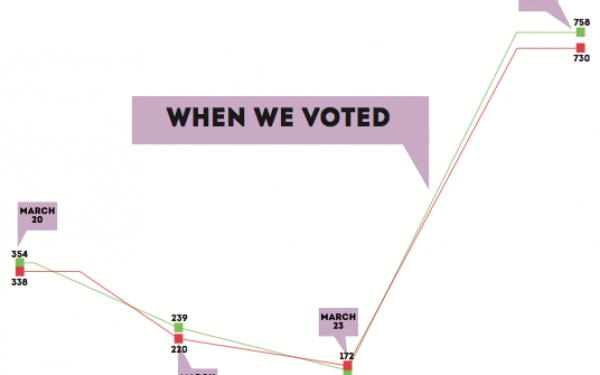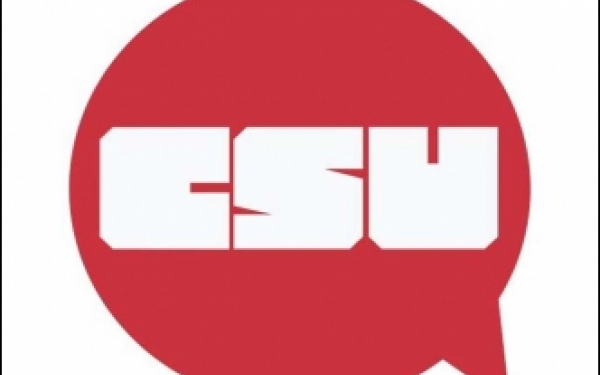Elections Spring a Leak
Purported Transcripts Mark Strange Turn in CSU DQs
For the second year in a row, disqualifications have marred the Concordia Student Union general elections, but this year, they were just the beginning of the controversy.
Following the disqualifications of A Better Concordia’s presidential candidate Schubert Laforest and VP Academic and Advocacy candidate Lucia Gallardo on Friday for allegedly not being registered Concordia students, The Link came into possession of documents alleged to be the most recent transcripts for the two candidates.
In the documents, all classes from the 2011-12 academic year have the code CAN-R in the letter grade column, which would indicate that the classes were not to be counted for credit for unclear reasons.
During an interview with The Link, Laforest and Gallardo said that there were factual errors with the transcripts, with Gallardo pointing out that the information under the category Immigration Status was false.
At 8:00 p.m. on Monday, Laforest posted an update on A Better Concordia’s Facebook page to further explain the issue.
“Today, we learned that an outdated, inaccurate version of the private student records of Schubert Laforest and Lucia Gallardo were leaked. After consulting with the Birks Student Centre, the Dean of Students Office and the Registrar’s Office, it was confirmed that this was a strictly illegal breach of privacy,” the statement read.
“The origins of the private documents are currently being investigated by multiple parties. It was also indicated that the leak most likely came from a Faculty or Department member.”
Laforest and Gallardo also made a request for temporary reinstatement in the campaign until the Judicial Board rules on their status as students. They feel it would be detrimental to their chances of victory to not be allowed to campaign.
In regards to his and Gallardo’s eligibility to run for office, Laforest would only say that their disqualification by the CEO had to do with their status as international students.
“In regards to specifics of the case, we decided we really don’t want to comment too much on that until the hearing, just so that then you can get the full story […] within the context of exactly what happened, with the proper documentation and evidence.”
“On a more broad scale, it comes down to the fact that we are international students, and we are dependent on a lot of different factors coming from different offices within the university and government. We need multiple permits to be here,” added Gallardo.
As of press time, a hearing has been scheduled for Laforest and Gallardo’s appeal on the morning of March 13. On March 14, both candidates will appear at the scheduled CSU Council meeting as part of an application for temporary status as members of the CSU.
“When we realized that we wouldn’t be getting facts within the timeline the CEO gave us, we applied for temporary membership in the CSU, so we could be eligible in that sense,” said Laforest. “Depending on how things go [with the JB], we’ll either leave it [on Council’s agenda] or take it off.”
Laforest currently holds the position of VP Internal of the Arts and Science Federation of Associations, a position he would be ineligible to hold if he is not a registered Concordia student.
Laforest admitted to having dropped his courses in the Fall semester due to immigration issues, and that he realizes this may have made his spot on the ASFA executive invalid.
“What ended up happening was [my classes] got dropped around finals,” he said. “Right now, I’m trying to fix this mess at the CSU. With regards to ASFA Council, it’s something I’m going to have to bring to them and see what they want to do. I have a few things in mind—certain motions to introduce—but that’s another case I’ll be working after this [is settled].”
“I don’t really know what to say,” said ASFA President Alex Gordon when reached for comment on March 9. “In my mind he is a student. I don’t see why he wouldn’t be. He’s been a student the whole semester and the whole year.”On March 9, The Link learned of the disqualifications when Chief Electoral Officer Ismail Holoubi confirmed in an email that Laforest and Gallardo “weren’t eligible to run because they aren’t registered students.”
The CEO is obligated to check on the status of students who have submitted their nominations with the Office of the Dean of Students, who consults with the database of the registrar.
Laforest said that there had been indirect contact with the Dean of Students through other organizations, and that the office had confirmed the two were students.
The Dean of Students, Andrew Woodall, could not comment on the files of individual students, as per university policy.
Laforest said Holoubi had informed A Better Concordia’s candidate for VP Clubs and Internal Nadine Atallah—who had been designated as the team’s contact for the CEO—of the ineligibilities March 5.
On March 9, Melanie Hotchkiss, Laforest’s opponent for the presidency, said that she had learned of the disqualification by reading an article on The Link’s website that day.
She said she received an email from Holoubi later that afternoon informing her of the situation, though she said the email did not give a reason.
She was told the election ballots, rather than giving the students the option to vote for either her or Laforest, would now feature her name alone and offer the options ‘yes,’ ‘no’ or ‘abstain.’
“I was really surprised,” said Hotchkiss. “I find it a bit concerning to know that the two of them weren’t registered students. That means they decided to get nomination signatures knowing they weren’t students and I think to an extent that shows a bit of a disregard for their team, because that puts their other candidates at a disadvantage.”
On March 11, Hotchkiss’ Concordia Could Be team sent out an email to campus media saying, “We want this election to be about candidates and platforms, not the Chief Electoral Officer. For too long CSU elections have been marred by controversy.
“Students deserve better, especially in the current context. Faith in our student union has slowly been deteriorating and we hope for a quick, fair, and honest resolution.”
—with files from Julian Ward
Update: Judicial Board Can’t Prove Student Status
-Laura Beeston
The status of students from A Better Concordia is still unclear, after the Judicial Board—an independent body of the Concordia Student Union—ruled there is not enough evidence to “conclusively prove” that they are students.
On March 9, CSU Chief Electoral Officer announced that presidential hopeful Schubert Laforest and VP Academic hopeful Lucia Gallardo’s student status made them ineligible to run for office.
The disqualifications were followed by documents sent to The Link alleged to be the most recent transcripts of the students, where all classes this academic year were marked with the code “CAN-R” in the letter grade column.
Both candidates denied these documents were accurate.
The JB met Tuesday morning to render their decision, and suggested in their ruling that “the students in question submit their latest academic transcripts, as well as any other official documents from the registrar that may aid in justifying their legitimacy as registered undergraduate students.”
The letter also added Ullyana Stefashkina to the students ineligible to run for office. She was running independently as an Arts and Science councillor.
JB member Nadim Kobeissi explained the candidates did not send any official record stating that, at the time of their disqualification, they were registered full-time students.
The JB were only given screen shots of emails between the candidates, the CEO and the Dean of Students. They are now encouraging the party to provide more records.
“After we issued our provisional decision we were sent a letter of attestation proving that two of the candidates are registered full-time students as of March 13th. However, […] we require evidence that shows that they were registered full-time students at the time of their disqualification,” explained Kobeissi.
According to A Better Concordia candidate Nadine Atallah, the students-in-question have applied for a fast-track procedure for an appeal, and were given a hearing for March 16 at 5:30 p.m.
The JB, in their ruling, reminded candidates of sanctions posed by CSU Bylaw 227, which states “an elector who is found to have signed a false declaration of eligibility shall forfeit his or her right as an elector for a period of two years”
More to come.

2_700_557_90.jpg)



_600_375_90_s_c1.jpg)

